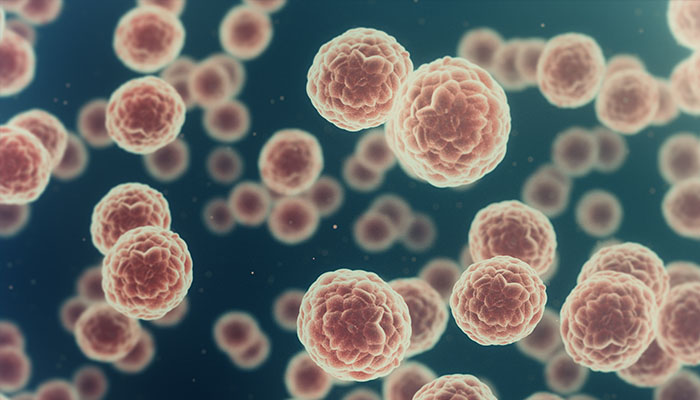HOW CAN WE HELP YOU? Call 1-800-TRY-CHOP
In This Section
CHOP Researchers Join Global Team to Take On Solid Cancers
droseyb [at] chop.edu (By Barbara Drosey)

CHOP researchers joined a new Cancer Grand Challenges team, called NexTGen, to develop effective T-cell therapies for pediatric solid tumors.
Children’s Hospital of Philadelphia researchers have joined a new Cancer Grand Challenges team that will receive $25 million to carry out team science on a global scale. Chosen from 11 finalists, the Next Generation T cell Therapies for Childhood Cancers (NexTGen) team will take on the Solid Tumours in Children Challenge to develop novel therapies that target the unique features of solid tumors in children.
CHOP scientists John Maris, MD, Giulio D’Angio Chair in Neuroblastoma Research, Patrick Grohar, MD, PhD, director of translational research in the Center for Childhood Cancer Research, Nikoloas Sgourakis, PhD, associate professor in the Center for Computational and Genomic Medicine, and Mark Yarmarkovich, PhD, senior scientist in the Maris Laboratory, are part of the NexTGen team of scientists and clinicians with expertise in immunology, proteomics, and mathematics from institutions in the United States, United Kingdom, and France.
Co-founded by Cancer Research UK and the National Cancer Institute (part of the National Institutes of Health), Cancer Grand Challenges supports a global community of diverse, world-class research teams to come together, think differently, and take on some of cancer’s toughest challenges. NexTGen is one of four newly announced teams, representing a $100 million collective investment to move progress in cancer research forward.
Current treatments fail for many children with solid cancers, which are especially challenging to treat due to tumor heterogeneity, hostile tumor microenvironment (TME), and a dearth of druggable targets. The NexTGen investigators plan to overcome these obstacles with advanced cellular engineering to realize their vision of engineered T-cell therapy for childhood solid cancers as a routine treatment within a decade.
“The technology CHOP brings to this grant is our work with PC-CARS to target previously unreachable proteins within neuroblastoma cells along with the ability to engineer receptors in CAR T cells for other childhood cancers,” Dr. Maris said. “This successful grant was enabled by our prior collaborative research projects and is a natural extension of our ongoing work as part of the pediatric cancer dream team supported by the St. Baldrick’s Foundation. This newly announced funding enables us to focus on childhood sarcomas, glioblastomas, and other childhood cancers with high unmet need.”
Drs. Maris, Grohar, and Sgourakis, who also hold faculty positions at the University of Pennsylvania Perelman School of Medicine, along with Dr. Yarmarkovich, will lead two of the grant’s work packages: identifying suitable targets for engineered T-cells and developing receptors and other engineering components that target tumor cells and resist or modulate the TME.
Investigators from University College London; Children’s National Medical Center; Washington D.C.; Stanford University School of Medicine; Cardiff University, Wales; and the Institut Cochin INSERM, Paris, will lead four additional work packages to understand the TME in pediatric solid cancers, evaluate the function of engineered T-cells developed in the component engineering work packages, translate and test approaches from the TME studies in clinical studies, and promote data sharing across all NextTGen work package teams.
Catherine Bollard, MD, director of the Center for Cancer and Immunology at Children’s National Hospital in Washington, D.C, and Martin Pule, clinical senior lecturer and honorary consultant in haematology at University College London Hospital, will co-lead the NexTGen team in their work to develop next-generation therapies for children with solid cancers.
“Cancer Grand Challenges provides an extremely exciting opportunity to integrate parallel strategies in addressing the most difficult problems in the field,” Dr. Yarmarkovich said. “It’s an honor to be a part of this talented team comprised of world experts across various domains and it’s a privilege to be working with this group on the common vision of helping cancer patients.”
The team, co-funded by Cancer Research UK, the National Cancer Institute and The Mark Foundation for Cancer Research, aims to bring much-needed new treatments to children with solid cancers. Cancer is a leading cause of death by disease in children worldwide. Although survival has increased for some pediatric cancers, such as blood cancers, survival for some solid tumors has been stagnant for more than 30 years. The team hopes to build a much deeper understanding of childhood cancers and develop and optimize novel therapies for children with solid tumors, ultimately hoping to improve survival and diminish the lifelong toxicities often experienced by survivors.
Durable responses in refractory lymphoid cancers without long-term toxicity is required to develop novel therapeutics for pediatric solid cancer. Researchers think this is achievable with engineered T-cell therapies, hypothesizing that coupling of advanced cellular engineering along with progressive clinical development is the fastest route to developing effective T-cell therapies for pediatric solid tumors.
“With our Cancer Grand Challenge, we hope to bring next-generation CAR T-cell therapies to children with solid tumors,” said team co-lead Dr. Bollard. “What excites me most is the energized, passionate group of people we’ve brought together to take this challenge on. Big problems remain to be addressed, but we believe they can be solved, and that we’re the team to solve them.”